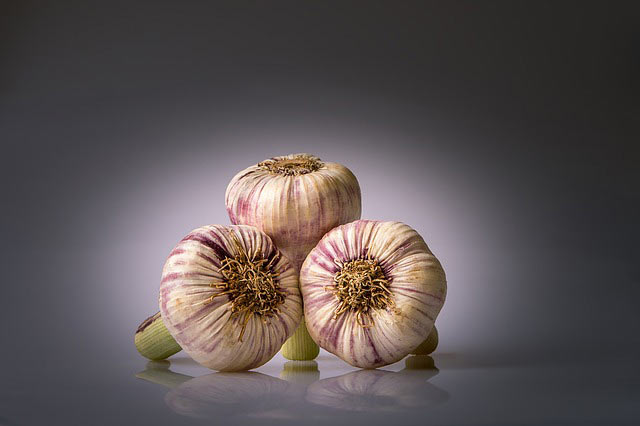Garlic allergy might sound strange to many of us, especially given the fact that garlic has been around for millennia, and is also one of the most widely used and healthiest root veggies in today’s world.
Such allergies usually results in symptoms ranging from occupational asthma that temporarily shuts off the respiratory system, to contact dermatitis, which manifests in the form of various skin ailments such as eczema and acne.
In this article, we will go into deep details about garlic allergy, its symptoms and some of the best practices to handle it.
Here is a sneak peek at what this article will be about:
The Nature of Garlic Allergies
A certain class of veggies triggers disturbances in gastrointestinal organs. In professional nutritionist’s speak, these foods, including onions, chorizo, and garlic, are roughly classified into a catalog whose acronym is FODMAP.
These foods possess a similar range of protein complexes, so a defective immune system that misfires against garlic intakes will react in the same manner to the intake of the other food items in FODMAP. This pattern of reaction is labeled as cross-reactivity.
A garlic allergy revolves around a dysfunctional reaction of the immune system to garlic intake.
The immune system misreads garlic as a harmful substance and gears up to repel the danger.
On the extreme, the allergic reaction can result in a full-blown anaphylaxis or asthma attack within minutes of contact with garlic.
Generally, food allergies are born out of the activities of antibodies called immunoglobulin E. These antibodies send out false distress signals that lead up to an unwarranted rapid secretion of histamines, the metaphorical foot soldiers of the immune system.
Histamines wield extensive powers and can cause downright system failures in their wake. The effects of this health reality range from a temporary seizure of respiratory organs to skin ailments such as eczema.
Things can take a bad turn when you consume garlic, not born out of an allergic reaction, but as a consequence of garlic intolerance. The difference between these two types of reactions is histamines stimulation.
Reactions caused by intolerance result in stomach upsets and gastrointestinal problems, but does not give rise to histamines production.
Allergic reactions can take a turn for the worst; a full-blown asthma attack can result from the slightest exposure to garlic.
Garlic intolerance might lead to heartburn or gastrointestinal problems, but it does not manipulate the immune system.
Garlic intolerance also leads to different outcomes depending on unique body chemistry.
For starters, you need to be given a full examination of your condition once you begin noticing any of these symptoms upon garlic intake. A blood test or skin test is usually the
A Brief History of Garlic Allergies
Modern science is yet to successfully trace the origins of garlic allergies. Garlic allergy is one of those medical conditions that just doesn't seem to fit into the evolutionary framework.
Allium plants have been ubiquitous food items for ages, across tribes and cultures. It’s unthinkable to hold that nature brought about an allergic reaction to a widely used food in humans that might possibly cause instant death.
Garlic production on the global scale surpassed 50 billion pounds in 2014, and global onions production was an aggregate 6.2 billion pounds that same year. You can find traces of allium plants in just about any day’s regular meal in any part of the world.
It’s hard to conceive of a natural propensity to experience fiery allergic reactions from the consumption of such a food item. Many doctors well-versed in allergies still have a hard time dealing with patients with garlic allergy.
Researchers are inclined to believe the health condition is a nascent health phenomenon.standard protocol used by physicians to examine allergic conditions.
A Rundown of Garlic Allergy Symptoms
Depending on the level of exposure to garlic, and a host of other poorly understood variables, symptoms of garlic allergy might turn up in tampered, extreme manifestations, and everything in between.
These include skin inflammation, itchy nose and watery eyes, nausea, stomach cramps, vomiting, and diarrhea. These symptoms can manifest immediately or a few hours after the exposure.
Instant reactions are usually rare, and often manifest in a mild way such as stomach cramps and skin inflammation.
Severe reactions like full-blown asthma and anaphylaxis are can turn out fatal, but are quite a rarity. In extremely rare instances, the slightest exposure to infinitesimal traces of dust from garlic skin can induce a highly intense asthma attack.
However, the severe reactions most likely take effect after immense exposure to raw garlic. Asthma attacks break-forth like wheezing or short breathes.
Signs of an anaphylaxis onset include low blood pressure, dizziness, constricted airways, lightheadedness, and paranoia.
Symptoms of garlic intolerance take effect only in the gastrointestinal systems, resulting in stomach cramps, diarrhea, and heartburn.
How To Better Handle A Garlic Allergy Condition?
Get Proactive
Even the mild symptom should be treated as a serious cause for concern. You can never tell when next you might unsuspectingly expose yourself critically and trigger an onset of severe symptoms.
Cooked Garlic Poses a Lesser Threat Than Raw Garlic.
Recent medical records of the condition show a higher level of tolerance for cooked garlic in most patients. One of the explanations flying around is that the proteins in garlic, which set off the allergic reactions, degenerate when exposed to heat.
It’s Best to Arduously Determine The Effects of Various FODMAP Foods.
On your own, as a garlic allergy patient, you can learn more about the mysterious processes that give rise to allergic reactions by taking yourself on and off the various foods one at a time.
Ditch Processed Foods and Junk Foods:
Always take your time to analyze the ingredients lists of any processed food before checking out with it. Canned soup, bread products, frozen entrees, sauces, and pasta all feature varying quantities of allium plants.
You can take advantage of product’s toll-free numbers to ask for an in-depth rundown of ingredients.
Endeavor Not To Let Your Guard Down at Any Time.
Processed foods always pose a viable threat to garlic allergy patients. When eating out or shopping for processed food, you need to treat the menu and ingredients lists with kid gloves always.
Mention your condition to waiters, or bring an allergy card of allergen-free recipes along with you when eating out. There are a lot of other ingredients that are savory replacements for allium foods like curry, basil, fennel, and paprika. You can experiment with a lot of recipes.
Call Any Health Emergency Service in Closest Proximity When Allergic Reactions Set In.
Do not hesitate to urgently seek medical attention when you experience any of these symptoms.
There you have it fellow health junkies. That’s my take on garlic allergy, its various symptoms and the tips to better handle it.Conclusion
If you have any questions or observations, don’t hesitate to reach out and let us know in the comment below. We are more than happy to hear from you.






I think I got an allergic reaction to ,too much powdered garlic. I have hives, and severe itching. How long does this allergy last. Can it last for days ?
Hi Henry,
We are so sorry this happened to you. Hopefully, it cleared up! Everyone is different and if you suspect you are having an allergic reaction to a food, you should reach out to your doctor 🙂
Thank you for your comment!
My daughter is 11 mo and when she was 7mo she had a severe allergic reaction to garlic, and later we found out that she is anaphylactic. We had given her green beans with a little bit of garlic powder mixed in. Our allergist was not able to give us ANY information about garlic allergies since it is so rare to have a full blown allergy to it. What is the likelyhood of a baby growing out of a garlic allergy?
What a scary experience to have to go through, I’m sorry to hear about your baby’s allergy. Every person is different when it comes to allergies, I’m afraid I can’t answer as to the likelihood of growing out of it. At least there are still many spices/ways to make food tasty without using garlic! Wishing you and your family good health!